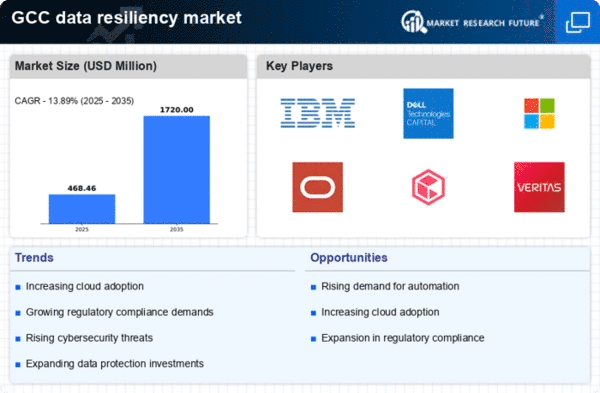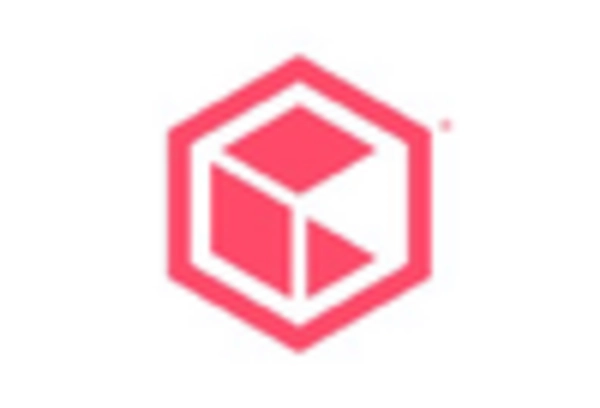Growing Cybersecurity Threats
The data resiliency market is experiencing heightened demand due to the increasing frequency and sophistication of cyber threats. Organizations in the GCC are recognizing the necessity of robust data protection strategies to mitigate risks associated with data breaches and ransomware attacks. In 2025, it is estimated that cybercrime could cost businesses globally over $10 trillion annually, prompting GCC companies to invest significantly in data resiliency solutions. This trend indicates a shift towards proactive measures, including data backup, recovery solutions, and comprehensive cybersecurity frameworks, to ensure business continuity and safeguard sensitive information. As a result, the data resiliency market is likely to expand as organizations prioritize investments in technologies that enhance their resilience against evolving cyber threats.
Digital Transformation Initiatives
The ongoing digital transformation initiatives across various sectors in the GCC are acting as a catalyst for the data resiliency market. Organizations are increasingly adopting cloud computing, big data analytics, and IoT technologies, which necessitate robust data management and protection strategies. In 2025, The GCC's digital economy is projected to reach $100 billion, highlighting the urgency for businesses to ensure data integrity and availability. As companies transition to digital platforms, the risk of data loss or corruption escalates, prompting investments in data resiliency solutions. This trend suggests that organizations are prioritizing the implementation of comprehensive data backup and recovery systems to support their digital transformation efforts, thereby driving growth in the data resiliency market.
Rising Data Volumes and Complexity
The exponential growth of data generated by organizations in the GCC is significantly impacting the data resiliency market. With the increasing reliance on data-driven decision-making, businesses are facing challenges related to data storage, management, and protection. It is estimated that by 2025, the total data generated in the region could exceed 100 zettabytes, necessitating advanced data resiliency solutions to ensure data availability and integrity. The complexity of managing diverse data types, including structured and unstructured data, further complicates the landscape. Consequently, organizations are compelled to invest in sophisticated data resiliency strategies that encompass data backup, disaster recovery, and data governance, thereby driving the growth of the data resiliency market.
Regulatory Pressures and Compliance
The data resiliency market is significantly influenced by the increasing regulatory pressures faced by organizations in the GCC. Governments are implementing stringent data protection laws, necessitating compliance with regulations such as the General Data Protection Regulation (GDPR) and local data protection frameworks. Companies are compelled to adopt data resiliency solutions to ensure compliance and avoid hefty fines, which can reach up to €20 million or 4% of annual global turnover, whichever is higher. This regulatory landscape drives organizations to invest in data management, backup, and recovery solutions, thereby propelling the growth of the data resiliency market. As compliance becomes a critical business requirement, the demand for effective data resiliency strategies is expected to rise, fostering innovation and investment in this sector.
Increased Awareness of Business Continuity
The growing awareness of the importance of business continuity planning is influencing the data resiliency market in the GCC. Organizations are recognizing that disruptions, whether due to natural disasters, cyber incidents, or technical failures, can have severe financial implications. In 2025, it is estimated that The average cost of downtime for businesses could reach $5,600 per minute, underscoring the need for effective data resiliency solutions. As a result, companies are increasingly investing in comprehensive business continuity strategies that include data backup, recovery, and risk management. This trend indicates a shift towards a more proactive approach to data management, driving demand for innovative solutions within the data resiliency market.
















